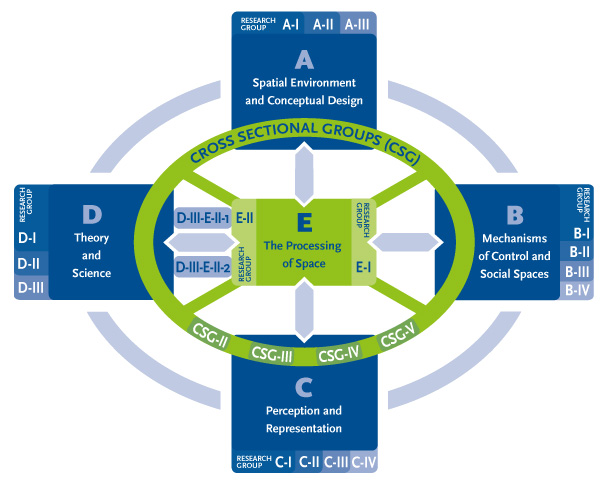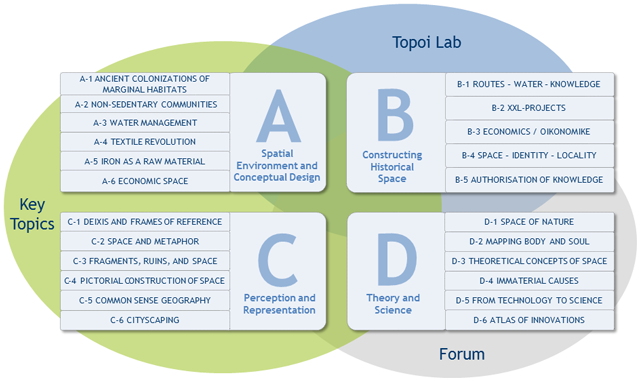Research Programm
The guiding question of the Excellence Cluster was the interaction between space and knowledge in the formation and transformation of ancient societies
The ancient world offers an unparalleled field of investigation set amidst the archives of human history: not only can the roots of many modern concepts be traced back to antiquity, but the full breadth of their macro-historical formation, reformation, and transformation can only be fully perceived from the perspective of the ancient world. These archives provide us with data of every kind on subjects ranging from climate change and the social dynamics surrounding mechanical innovations to the diffusion of technical knowledge, and even the development of new forms of space (political, cosmological, or ensouled). Topoi represented a new kind of laboratory in which macrohistorical knowledge could be collected, tested, and interpreted.
Space in this context refers to a wide range of real and conceptual spaces. Topics ranged from the archaeological and geo-scientific reconstruction of ancient landscapes to the organization of spaces from a historical perspective; and from the representation of spaces in images and texts to the scholarly reconstruction of those spaces in ancient philosophy and mathematics. The category of knowledge not only encompassed ancient knowledge of spatial relations in the world. It also concerned the form in which information is recorded and passed on and refers to practically applied knowledge, empirical knowledge and theoretical treatments of natural phenomena.
The chronotopic strata that the project investigated ranged from the beginnings of permanent settlements and agriculture in the 10th and 9th millennium BC to the end of the long late antiquity in the 8-9th century AD, the medieval and early modern periods. From a geographical perspective, Topoi projects included societies of the Mediterranean region, the ancient Near East and the Black Sea region, as well as cultures of the Eurasian steppes and Central Europe.
The cluster focused on constructive and transformative processes in antiquity as well as on critical reflections on our own methods and theoretical framework, including archaeological and scientific methods, documentation and interpretation of textual and iconic remains. The presentation of the ancient world to our contemporaries through vivid exhibitions of these findings in museums and other public arenas also formed an integral part of its work. The interdisciplinary setting as well as the rich data and object collections of the partner institutions offered an ideal research environment.
From Topoi I to Topoi II
Exhaustively surveying the two dimensions of space and knowledge required a continual oscillation between space-driven analyses of knowledge (particularly evident in the application of archaeological and geo-scientific techniques to the construction of water manage¬ment regimes) and knowledge-driven analyses of space (the philological, philosophical, and historical investigations of space as a heuristic category for the linguistic, textual, and iconogra¬phic mediation of knowledge). Building on fundamental lines of research in the context of standard disciplines, yet relying ultimately on intensive discussions within and between the different research groups, we have experienced a development as follows:
- In Topoi I (2007–2012), space represented the central category and thematic nexus in our considerations of knowledge. The topic was knowledge about space.
- In Topoi II (2012–2019), the research program integrated the category of knowledge into the analysis of spatial phenomena. The topic was knowledge through space.
In the interplay of space and knowledge, the role of knowledge as a factor in making sense of the formative and transformative processes of ancient societies and their social systems has become increasingly central in the work of the researchers. Knowledge bears on objects, events, and processes, as these exist in space, even as space itself is used to organize, regiment, and constrain the thematic and formal features of the knowledge in question. Consequently, the research agenda more and more shifted towards a focus on the transformation and transmission of knowledge, while retaining questions of space.


